
 i_need_contribute
i_need_contribute

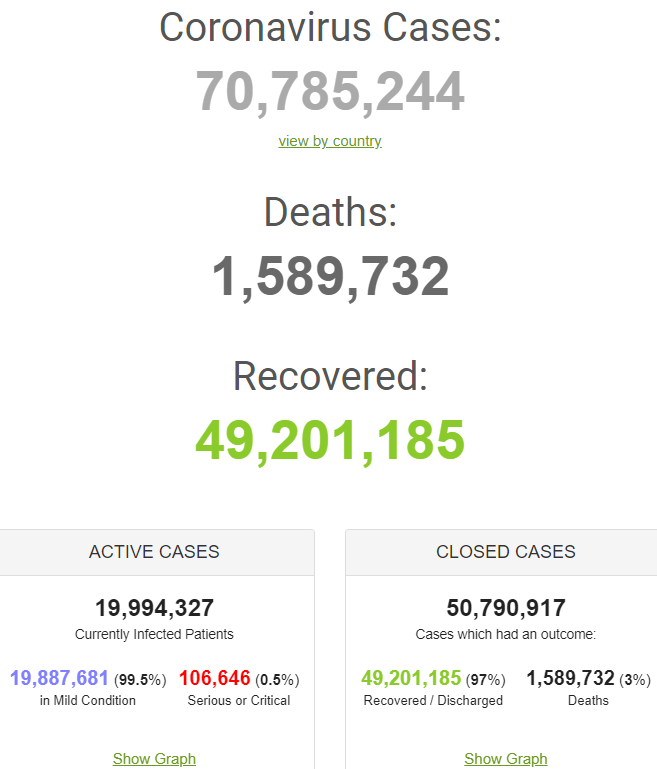
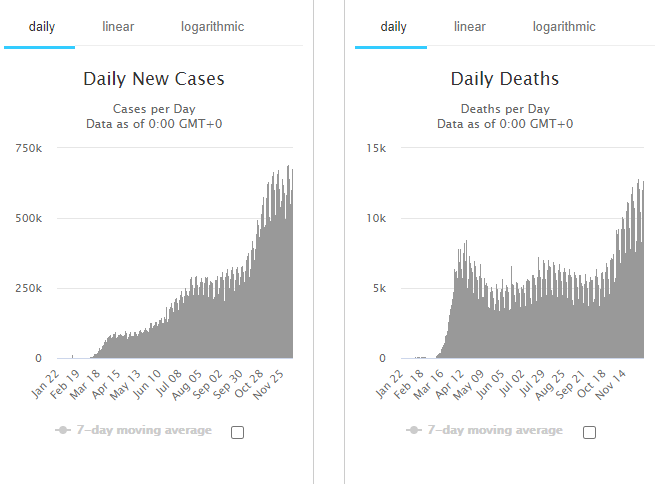
|
Country, |
Total |
New |
Total |
|
World |
70,700,295 |
+678,685 |
1,587,666 |
|
16,039,393 |
+217,779 |
299,692 |
|
|
9,796,992 |
+34,666 |
142,222 |
|
|
6,783,543 |
+53,425 |
179,801 |
|
|
2,569,126 |
+27,927 |
45,280 |
|
|
2,337,966 |
+13,750 |
56,940 |
|
|
1,787,783 |
+20,964 |
63,082 |
|
|
1,787,147 |
+16,999 |
62,626 |
|
|
1,748,567 |
+30,424 |
15,751 |
|
|
1,734,386 |
+4,595 |
47,344 |
|
|
1,482,216 |
+6,994 |
40,431 |
|
|
1,399,911 |
+7,778 |
38,484 |
|
|
1,270,432 |
+28,179 |
21,233 |
|
|
1,205,229 |
+11,974 |
111,655 |
|
|
1,102,096 |
+13,749 |
21,630 |
|
|
1,083,023 |
+10,403 |
51,496 |
|
|
979,111 |
+1,799 |
36,499 |
|
|
858,714 |
+13,371 |
14,470 |
|
|
836,764 |
+8,166 |
22,747 |
|
|
598,933 |
+6,033 |
18,336 |
|
|
597,643 |
+3,071 |
17,603 |
|
|
585,685 |
+8,720 |
9,902 |
|
|
571,253 |
+1,380 |
12,526 |
|
|
566,440 |
+1,662 |
15,774 |
|
|
563,341 |
+6,407 |
9,284 |
|
|
539,107 |
+7,067 |
12,948 |
|
|
485,965 |
+1,861 |
6,967 |
|
|
445,535 |
+1,378 |
8,701 |
|
|
442,069 |
+6,739 |
13,109 |
|
|
429,280 |
+3,138 |
8,603 |
|
|
391,529 |
+3,345 |
6,492 |
|
|
359,415 |
+141 |
6,012 |
|
|
352,397 |
+2,126 |
2,961 |
|
|
335,207 |
+3,134 |
5,278 |
|
|
313,688 |
+2,686 |
4,163 |
|
|
265,003 |
+5,415 |
6,451 |
|
|
253,121 |
+2,902 |
3,250 |
|
|
249,224 |
+7,393 |
2,172 |
|
|
245,650 |
+1,217 |
1,663 |
|
|
200,379 |
+1,151 |
13,850 |
|
|
185,424 |
+2,447 |
3,287 |
|
|
181,405 |
+1,255 |
602 |
|
|
178,953 |
+4,570 |
1,657 |
|
|
174,568 |
+3,075 |
5,405 |
|
|
168,573 |
+2,733 |
2,465 |
|
|
163,992 |
+4,620 |
2,420 |
|
|
162,774 |
+4,219 |
1,793 |
|
|
154,392 |
+1,939 |
1,238 |
|
|
Dominican |
151,721 |
+1,560 |
2,358 |
|
149,815 |
+1,127 |
1,882 |
|
|
146,060 |
+214 |
9,004 |
|
|
145,495 |
+291 |
910 |
|
|
145,240 |
+1,174 |
2,416 |
|
|
142,187 |
+1,778 |
1,170 |
|
|
140,516 |
+163 |
240 |
|
|
139,159 |
+777 |
2,088 |
|
|
127,786 |
+659 |
4,345 |
|
|
125,669 |
+179 |
1,463 |
|
|
124,921 |
+3,125 |
1,104 |
|
|
122,685 |
+1,715 |
2,500 |
|
|
121,253 |
+1,533 |
3,370 |
|
|
120,147 |
+445 |
6,854 |
|
|
115,360 |
+526 |
1,779 |
|
|
112,792 |
+617 |
2,961 |
|
|
107,814 |
+958 |
3,758 |
|
|
106,280 |
+428 |
938 |
|
|
104,879 |
+1,887 |
910 |
|
|
104,487 |
+1,321 |
2,201 |
|
|
100,489 |
+3,132 |
918 |
|
|
91,922 |
+1,849 |
1,949 |
|
|
90,958 |
+812 |
1,914 |
|
|
90,579 |
+565 |
2,564 |
|
|
90,305 |
+644 |
1,568 |
|
|
89,183 |
+661 |
1,273 |
|
|
88,632 |
+137 |
347 |
|
|
86,673 |
+12 |
4,634 |
|
|
83,882 |
+3,329 |
735 |
|
|
78,499 |
+2,234 |
396 |
|
|
76,391 |
+379 |
1,306 |
|
|
75,203 |
+303 |
2,117 |
|
|
74,498 |
+146 |
611 |
|
|
71,344 |
+675 |
1,190 |
|
|
70,883 |
+929 |
2,051 |
|
|
58,297 |
+6 |
29 |
|
|
52,738 |
+116 |
326 |
|
|
46,061 |
+873 |
965 |
|
|
40,165 |
+558 |
566 |
|
|
40,098 |
+682 |
564 |
|
|
40,037 |
+480 |
384 |
|
|
40,023 |
+498 |
382 |
|
|
5,337 |
+4 |
117 |
|
|
5,011 |
+15 |
46 |
|
|
4,169 |
+18 |
60 |
|
|
1,385 |
+4 |
35 |
Retrieved from: https://www.worldometers.info/coronavirus/
From CNN's John Defterios and Stephanie Bailey
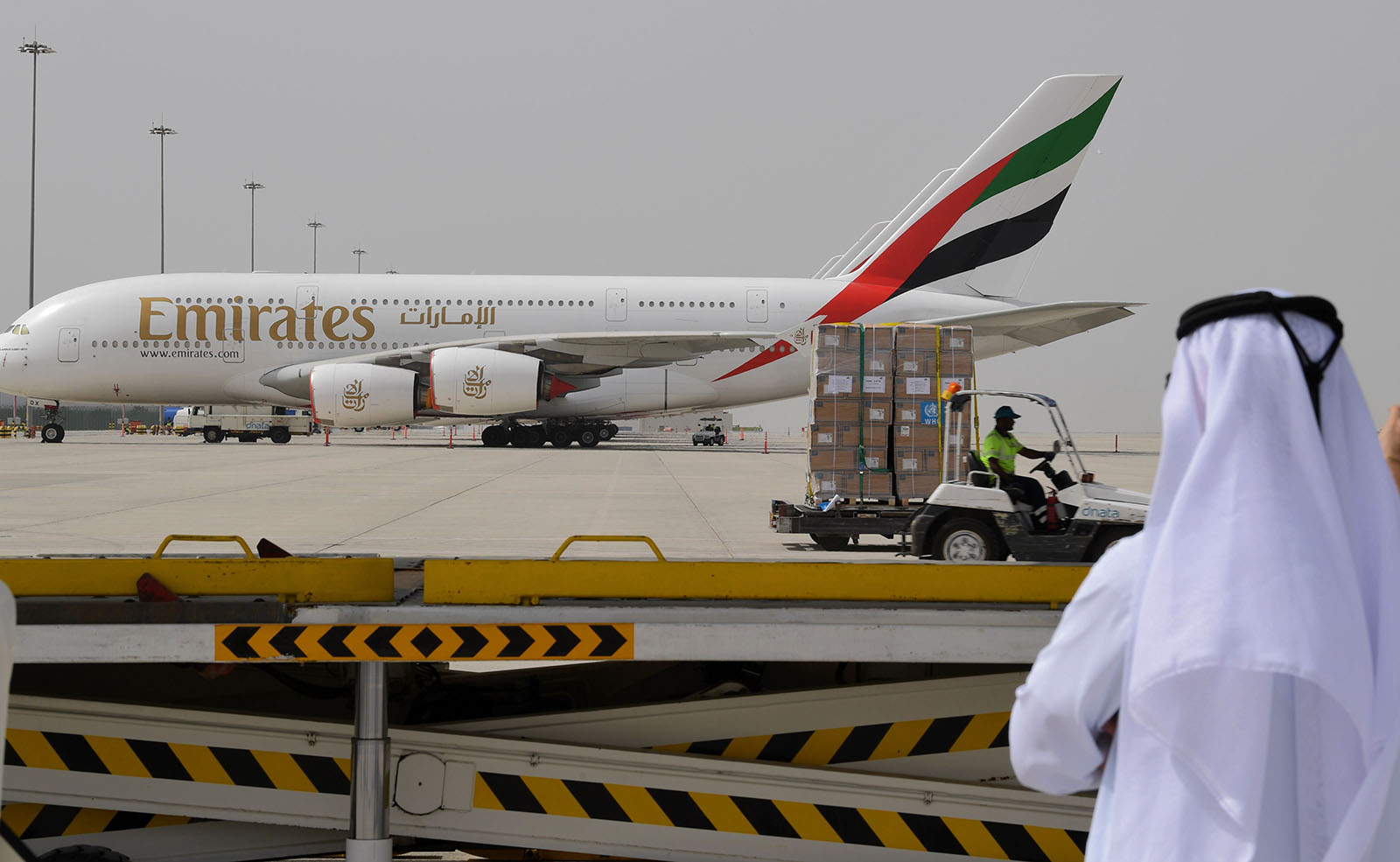
Tonnes of medical equipment and coronavirus testing kits provided by the World Health Orgnization are pictured passing by an Emirates airlines Airbus A380-861, at the al-Maktum International airport in Dubai on March 2. Karim Sahib/AFP/Getty Images
Few sectors have been hit as hard by the coronavirus pandemic as the aviation industry.
Last month, the International Air Transport Association forecast the crisis will cost airlines $157 billion this year and next -- and the sector has already cut tens of thousands of jobs.
But Tim Clark, president of the Emirates airline, sees reason to be optimistic. He thinks business travel could bounce back in 2022.
Clark recently spoke with CNN's John Defterios about the recovery of business travel and Emirates' imminent role as a distribution center for future Covid-19 vaccines.
Here's what he had to say on when business travel will get back to normal:
"What has happened as a result of being locked down, as a result of having to engage in (online communication) networks, whether it be Zoom or (Microsoft) Teams, I saw it in the mid '90s, when we digitized the global economy and all these tools came to market. The digital world ruled, the age of information came along, and everybody said, 'you know what's going to happen? We're not really going to travel anymore,'" Clark said.
"The converse happened. Between 1995, and 2015 to 2018, the demand for business travel grew exponentially. The more they (people) interacted, the more they traveled. As we get back to normal, as the economy is strengthened, as cash starts flowing back into the businesses that have been affected, we'll start to see business travel bounce back, and we'll see it grow. It will not slow down."
From CNN’s Fred Pleitgen and Claudia Otto in Berlin
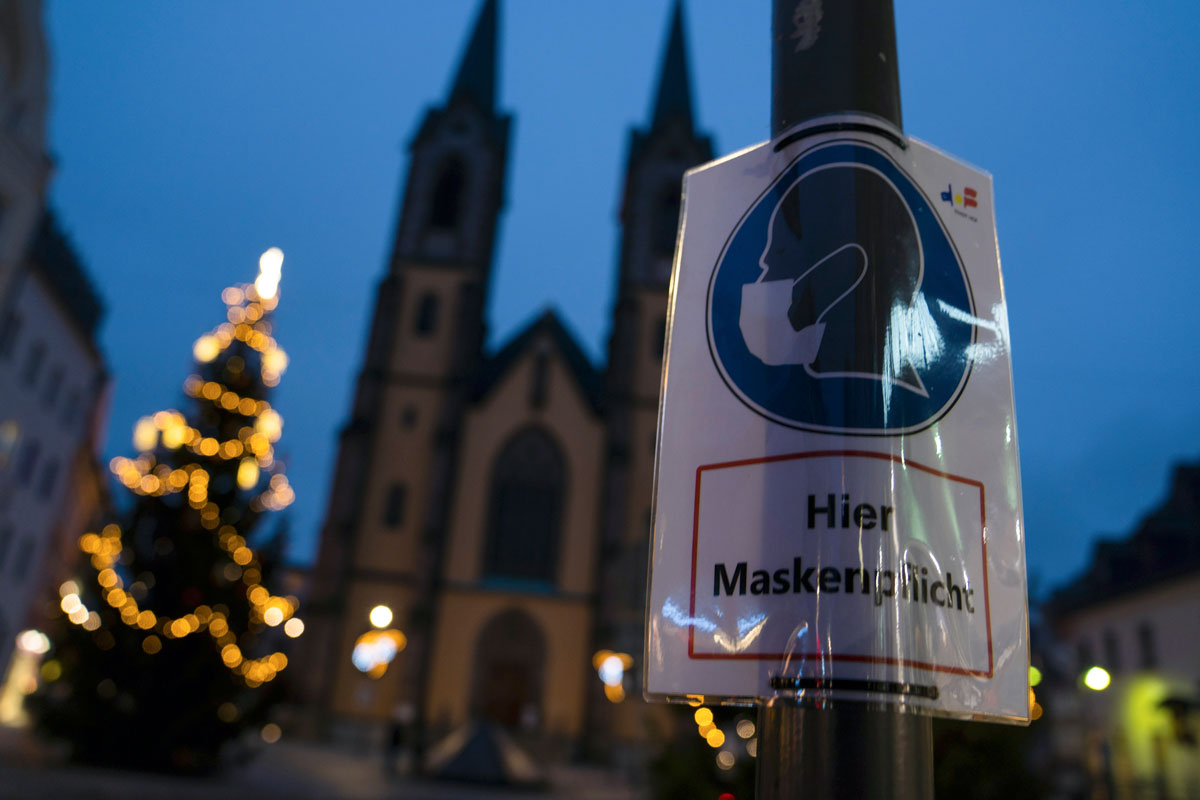
A sign reminding people that masks are required in Hof, Bavaria is seen in front of the St. Marien church on December 10. Nicolas Armer/picture alliance/Getty Images
Germany on Friday announced it had recorded 598 coronavirus fatalities in the previous 24 hours, according to data from the Robert Koch Institute, the country's center for disease control.
It was Germany's highest single-day coronavirus death toll since the pandemic began.
The nation also registered a record 29,875 new confirmed infections on Friday -- roughly 6,000 more than the day before.
German lawmakers will meet in the coming days to tighten lockdown measures in a bid to get the surge in infections under control.
According to Johns Hopkins University, there are now 1,287,092 confirmed coronavirus infections in Germany, including 21,064 related deaths.
From CNN's Paula Newton
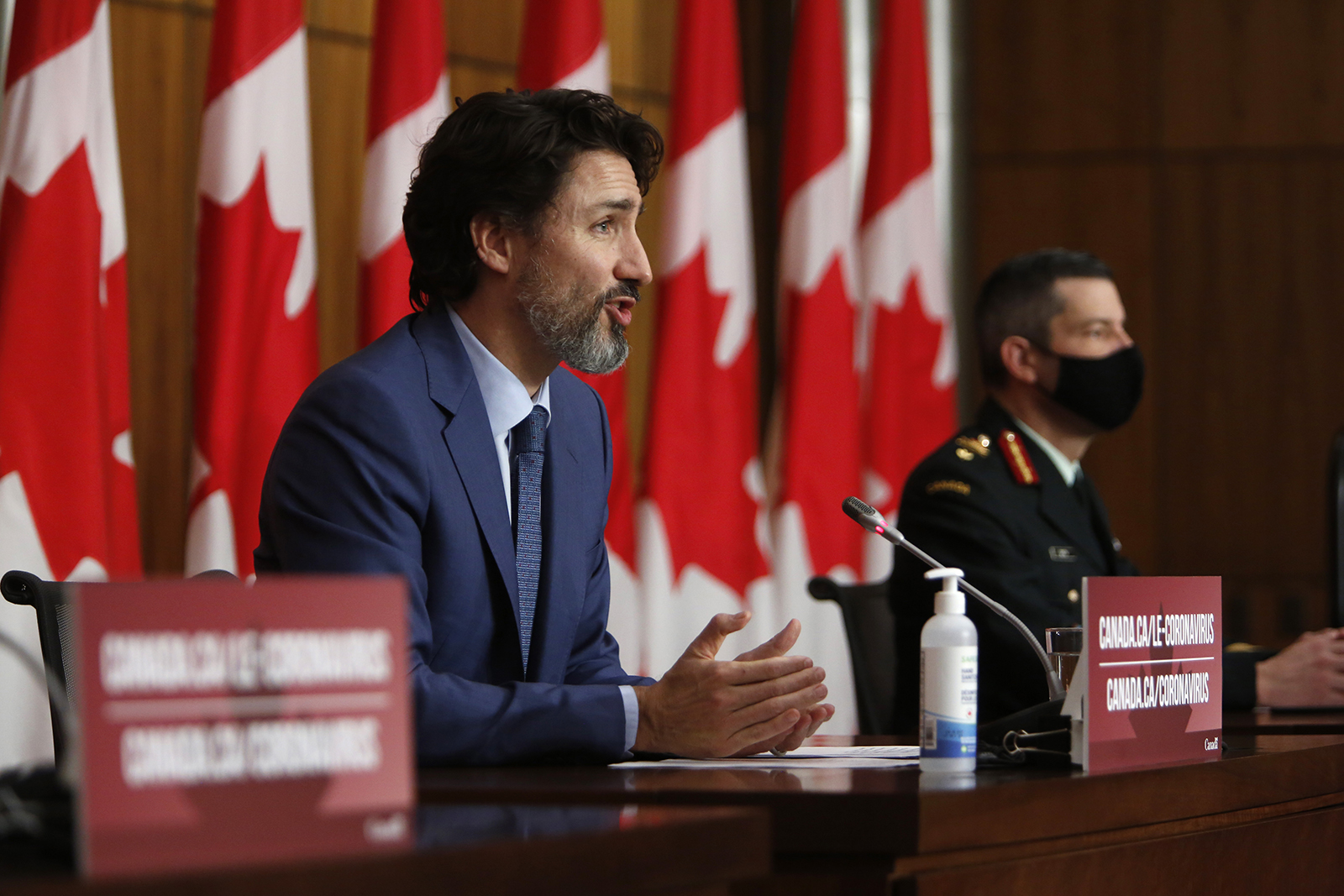
Justin Trudeau, Canada's Prime Minister, speaks during a news conference in Ottawa, Ontario, Canada, on December 10. David Kawai/Bloomberg via Getty Images
There was sobering news for Canadians Thursday as public health officials in several provinces said they were coping with an increase in infections despite new restrictions and lockdowns.
Prime Minister Justin Trudeau underscored the need to keep up with public health protocols as he announced that vaccines would arrive in Canada by Monday.
“The first 30,000 doses are expected to arrive on Canadian soil in just a few days. To all Canadians, if you’re feeling relieved and hopeful, you’re not alone, this is the good news we all need but remember this is only the first step in what will be a massive project over a long winter,” said Trudeau during a news conference in Ottawa Thursday evening.
Canada is not disclosing logistics or tracking information on the Pfizer/BioNTech vaccine as it enters the country because of what officials say are "credible" security concerns.
But Trudeau stressed he does not believe there will be any disruptions as the vaccines make their way from Belgium to Canada.
The timeline on vaccines in Canada comes as several provinces -- including Canada’s two largest, Quebec and Ontario -- logged record cases of Covid-19 in recent days, with officials saying lockdowns in both Toronto and Montreal are having little effect.
Ontario released new modeling Thursday and confirmed that according to mobility data throughout the province, people are traveling outside their homes at close to normal levels and likely not limiting contacts as much as needed to stop the spread of the virus.
Montreal broke a single-day record Thursday with 648 new cases of Covid-19, a growth rate the city’s public health director called "alarming."
“I know we’re all tired, but we need to make an effort,” said Dr. Mylène Drouin, Montreal’s public health director, during a news conference Thursday.
From CNN’s Yoko Wakatsuki in Tokyo
Japan has reported a record number of new Covid-19 infections for the second straight day.
Japan’s Ministry of Health announced it recorded 2,955 new Covid-19 cases and 37 related deaths for Thursday.
That brings Japan’s total reported Covid-19 infections to 172,255 -- including 2,515 dead.
The Ministry's data shows 543 patients are in intensive care, while a further 22,272 are receiving treatment in hospitals.
The capital Tokyo posted its highest number of daily infections yet with an additional 602 cases. At least 59 patients remain in critical condition, with 1,826 more in hospital.
Osaka counted 415 new cases. Osaka Gov. Yoshifumi Yoshimura said Thursday he was expecting the Self-Defense Forces' medical support team to be dispatched to local hospitals.
Japan's medical expert advisory board was critical about the effectiveness of the government's prevention measures to fight the recent surge in cases.
"It's hard to say that the measures taken so far have been effective," the chairman of the advisory board, Takaji Wakita, said in a press conference late Thursday.
"Overall, the measures were not successful to curb the new infection cases."
Retrieved from: https://edition.cnn.com/world/live-news/coronavirus-pandemic-12-11-20-intl/index.html

The European Medicines Agency, located in Amsterdam, did not disclose who was behind the cyberattack.Credit...Remko De Waal/EPA, via Shutterstock
The European Medicines Agency, the European Union’s top drug regulator, whose approval is necessary for countries in the bloc to begin rolling out the coronavirus vaccine, has begun an investigation after it was hit by a cyberattack, it said on Wednesday.
The agency, which is reviewing vaccine candidates, did not provide details about the target or the date of the attack. But shortly after the announcement, Pfizer and BioNTech said in their own statement that some documents related to the regulatory submission of their vaccine and which were hosted on a server of the European agency, had been “unlawfully accessed.”
Pfizer and BioNTech said their systems had not been breached, and that no study participants appeared to have been identified as a result of the cyberattack.
The breach comes at a time of heightened threats faced by pharmaceutical companies, health care institutions and agencies involved in the production, approval and distribution of the vaccine.
Last week, IBM said it had detected a series of cyberattacks in September against companies involved in the distribution of coronavirus vaccines across the world and against a branch of the European Commission, the E.U.’s executive arm.
The European Medicines Agency is set to announce a decision on the Pfizer/BioNTech vaccine by Dec. 29. Although each country in the bloc will be in charge of its own rollout, the agency’s approval will pave the way for the largest vaccination campaign in the West, dwarfing the rollout that started this week in Britain and most likely posing more considerable logistical and security challenges.
Canada approved the Pfizer/BioNTech vaccine on Wednesday, becoming the second Western country to do so. Russia began the rollout of its own Sputnik 5 vaccine on Saturday.
The European Medicines Agency didn’t disclose who was behind the cyberattack, saying that it “cannot provide additional details whilst the investigation is ongoing.” Pfizer and BioNTech said in their statement that they were awaiting further information from the agency.
Cybersecurity experts have said that only state actors could carry out such operations. Microsoft revealed last month that hacker groups backed by Russia and North Korea had targeted several vaccine makers in the United States, Canada and France, among other countries.
“The intentions behind those attacks are to parasite Western efforts on the vaccine,” said Julien Nocetti, a researcher at the French Institute of International Relations who studies cybersecurity with a focus on Russian activities.
By breaking into the system of key actors involved in the vaccine or by disrupting distribution efforts, attackers could exact considerable damage, said Claire Zaboeva, a senior cyberthreat analyst at IBM’s Security X-Force.
Ms. Zaboeva said about the production and delivery of the vaccine: “If you manage to get the key to the whole kingdom, you have 500 options on the menu: collecting key timetables, which nations will get the vaccine, how it will get there, what companies will be associated with the delivery, or how it will be handled.”
Retrieved from: https://www.nytimes.com/live/2020/12/10/world/covid-19-coronavirus/the-eu-agency-assessing-coronavirus-vaccines-was-hit-by-a-cyberattack
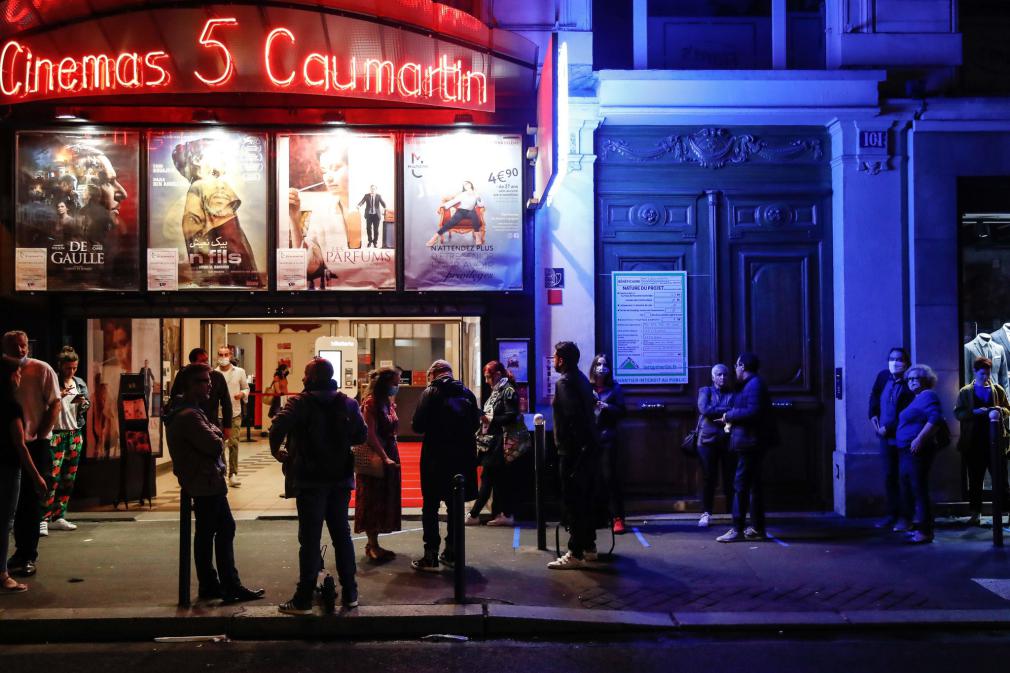
The reopening of theaters, museums and cinemas in France will be delayed for another three weeks.Credit...Abdulmonam Eassa/Agence France-Presse — Getty Images
The French government on Thursday said that it will delay relaxing some Covid-19 lockdown restrictions because rates of new cases were not falling as fast as expected.
The reopening of theaters, museums and cinemas, which was planned for Dec. 15, will be pushed back another three weeks, and a curfew that will replace the current lockdown will run earlier than planned.
The authorities had announced that a reprieve from the restrictions would be implemented on the condition that France reached a target of 5,000 new cases per day and fewer than 3,000 Covid-19 patients in intensive care.
Although the target of 3,000 patients in intensive care is within sight, France on Wednesday reported about 15,000 new cases, dampening hopes that daily new cases could fall to 5,000 by next Tuesday.
“We are not yet at the end of this second wave and we will not reach the objectives we had set,” Prime Minister Jean Castex said at a news conference on Thursday.
“The battle is far from won,” he said, adding that although the health situation improved for the past few weeks, it has plateaued in recent days.
The health minister Olivier Véran said that “we know that from plateau to peak sometimes things can go very fast.”
France will stick to a previously announced plan to end the lockdown on Dec. 15 and replace it with a nightly curfew. But in a departure from the plan, the curfew will start one hour earlier, at 8 p.m., and will not be waived for New Year’s Eve.
An exception will be made for Dec. 24, Christmas Eve, when people will be allowed to move freely during the night.
“The risk is that if we don’t change anything, the second wave will start again in the next few weeks,” Mr. Véran said.
On Thursday, the French Senate released a scathing report of a parliamentary commission that dissected the government’s failures in its handling of the coronavirus crisis and denounced “late and uncoordinated decisions” that delayed the government’s response to the pandemic.
The report specifically pointed to the failure of the government’s management of critical stocks of face masks. “The shortage of masks will remain the unfortunate symbol of the unpreparedness of the country and the lack of anticipation of the health authorities in the face of the crisis,” the report said.
It pointed out that Jérome Salomon, a top official at the health ministry, chose not to replenish stocks of masks in 2018, despite being warned about risks of shortages, and lobbied to retrospectively amend a scientific report in order to justify this decision. In a statement sent on Thursday night, Mr. Salomon denied that any pressure was exerted on the authors of the report.
“The mask fiasco was deliberately concealed by the government during the crisis,” the report said, adding that “a communication crisis has undermined the credibility of public and scientific discourse, the effects of which will be lasting.”
The parliamentary commission added that France’s strategy to test, trace and isolate in order to prevent a second wave of the virus proved unsuccessful, because of backlogs of test results, a limited contact tracing operation and an almost nonexistent isolation strategy.
Mr. Castex did not comment on the report, but acknowledged that a sense of fatigue surrounding the pandemic was growing in the country.
“I know your weariness, your doubts, your suffering,” Mr. Castex said. “I share them.”
Retrieved from: https://www.nytimes.com/live/2020/12/10/world/covid-19-coronavirus/france-will-delay-easing-some-virus-restrictions
Israel has reversed plans to impose a night-time curfew meant to prevent a new wave of coronavirus infections, minutes before the start of a Jewish holiday.
At the start of the week, prime minister Benjamin Netanyahu had announced a night-time curfew from Thursday, the first day of Hanukkah, the Festival of Lights.
This measure was criticised by a part of the population and public health experts, who considered it ineffective in combating the pandemic.
On Thursday, the government backtracked, saying “there will no new restrictions for Hanukkah” and that no new measures will be announced as long as fewer than 2,500 new Covid-19 infections are announced per day.
“If the number of new cases passes 2,500 per day, we will impose new restrictions for three weeks,” said a statement.
Since the start of the pandemic, Israel, a country of nine million people, has recorded 351,579 Covid-19 cases, including 2,937 deaths.
In the past 24 hours, just over 800 new infections were confirmed, according to the health minister.
The cancellation of the night-time curfew comes the day after the first Covid-19 vaccines ordered from US pharmaceutical giant Pfizer and its partner BioNTech arrived in Israel.
Israel has ordered 14m doses of the vaccine - covering seven million people, as two doses are required per person for optimal protection - from Pfizer and US biotech firm Moderna.
Netanyahu announced on Wednesday the country would start administering the vaccines from 27 December.
“I’m asking that every Israeli citizen be vaccinated, and to do so, requested to set an example and be the first person being vaccinated in Israel,” he announced Wednesday, saying “we’re bringing an end to the plague”.
Health ministry official Hezi Levy said on Thursday the first to be vaccinated would be medical personnel - around 250,000 people - then the elderly, at-risk people and their carers.
These groups would be followed by teachers, soldiers and finally, the rest of the population.
Here are the key developments from the last few hours:
· FDA panel approves Pfizer vaccine. A panel of outside advisers to the US Food and Drug Administration voted overwhelmingly to recommend emergency-use authorization of a vaccine developed by Pfizer Inc and its German partner, BioNTech SE.
· Canada could start vaccinations within days. Canada on Wednesday approved the use of the Covid-19 vaccine developed by Pfizer Inc and its German partner BioNTech SE and vaccinations are expected to start next week with high-risk people such as healthcare workers receiving the first doses.
· Rebound in carbon emissions expected in 2021 after fall caused by Covid. Greenhouse gas emissions, which plunged by a record amount this year because of the coronavirus pandemic, are set to rebound next year as restrictions are lifted further and governments strive to return their economies to growth, according to a global study.
· Biden advisor delivers stern Christmas warning. A top coronavirus adviser to President-elect Joe Biden delivered a stern holiday message to Americans on Thursday - “no Christmas parties” - and warned they face a Covid-19 siege for weeks to come despite the latest moves toward US government approval of a vaccine.
· South Korea mobilises military to help frontline workers. South Korea will mobilise military forces in the capital Seoul to help frontline health workers deal with a surge in coronavirus, with 689 new cases reported on Friday, and as the death toll and number of patients in critical care rose.
· Advisers to Mexican health regulator to review Pfizer vaccine on Friday. An advisory committee for Mexican health regulator Cofepris will review Pfizer’s Covid-19 vaccine application on Friday, a health official said, as the country registered another 11,897 coronavirus cases and 671 more deaths.
· Australia terminates vaccine deal with after false positives for HIV. The Australian government has terminated its agreement with Australian biotech company CSL Limited to supply 51m doses of a Covid-19 vaccine being developed by the University of Queensland, after vaccine trial participants returned false positive test results for HIV.